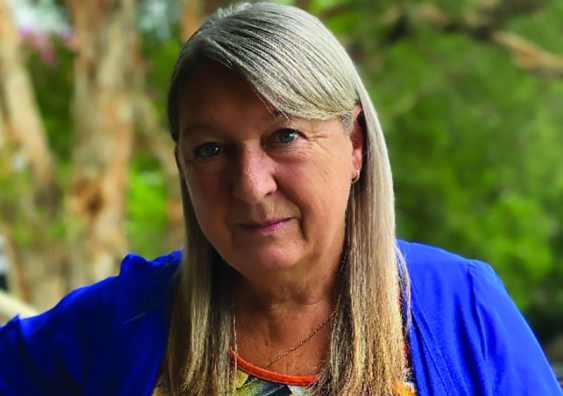Virtual reality project healing Indigenous trauma receives $2.8m MRFF grant
2024-10-11T09:00:00+11:00

Scientia Professor Jill Bennett, Rene Kulitja from NPY Women’s Council and Volker Kuchelmeister from the Big Anxiety Research Centre are collaborators on the innovative project.
Photo: Supplied.
The funding will further the development of innovative virtual reality tools to enable regional and remote communities to address trauma.
A UNSW Sydney project developing Indigenous-led virtual reality (VR) tools used for trauma support in regional and remote communities has been awarded a $2.8 million federal government grant.
The Transforming Trauma project, led by Scientia Professor Jill Bennett from UNSW Arts, Design & Architecture, will work with Aboriginal communities and organisations to develop culturally informed tools with the potential to provide psychosocial support and address intergenerational trauma.
Prof. Bennett said it’s the first time VR has been developed using contemporary trauma theory and Indigenous knowledge.
“VR is beginning to be used in clinical settings and for exposure therapies but what we’re doing is very different. We will be providing communities with tools that make sense of feelings and experiences associated with trauma, and which support the processing of trauma,” she said.
“This initiative builds on earlier workshops and VR projects we’ve done, including our work in the regional town of Warwick in Queensland where immersive audio-visual experiences were used by the First Nations community to help deal with the devastating impact of youth suicide in the town.”
The VR tools will be developed and used by diverse groups, including young men leaving the justice system and young mothers. Aboriginal organisations including We Al-li, NPY Women’s Council in the Central Desert in the Northern Territory and Mawarnkarra Health Service in Western Australia, are key collaborators.
The project will evaluate the cultural, psychosocial and health impacts of working with such tools.
An Australian Research Council Laureate Fellow, Prof. Bennett is director of the Big Anxiety Research Centre (BARC) at UNSW which was established to address mental health and wellbeing through community-based practice. Indigenous midwife, artist and trauma worker, Marianne Wobcke and immersive media designer Volker Kuchelmeister, also from BARC will work on Transforming Trauma.
The team this year won the Grand Jury prize for Best VR at The Sheffield Documentary Festival for their ground-breaking experience, led by Ms Wobcke. The VR artwork is an immersive audio-visual experience evoking early life in the womb and can be used in conjunction with therapeutic work supporting perinatal and intergenerational trauma.
UNSW Arts, Design & Architecture Dean, Professor Claire Annesley, said Prof. Bennett is doing world-first work in enhancing our understanding of how arts-based therapies can support people living with mental distress or trauma.
“Creativity is the key to an integrated and culturally responsive approach to mental health, and I congratulate Prof. Bennett and her team on receiving this grant,” she said. “This funding will be vital in fast-tracking real-world applications of these innovative tools.”
The grant has been provided from the federal government’s Medical Research Future Fund (MRFF) through the scheme. The 11-year program supports First Nations-led research to tackle health issues facing Aboriginal people and help close the health and mortality gap.
Related stories
-

‘He had no symptoms’: how wearable tech can help older Indigenous people catch heart problems – and save lives
-

New Closing the Gap data shows more First Nations Australians are in prison. Why?
-

Early-career researchers net $7m in funding
-

UNSW academics awarded more than $3m for Indigenous health research



